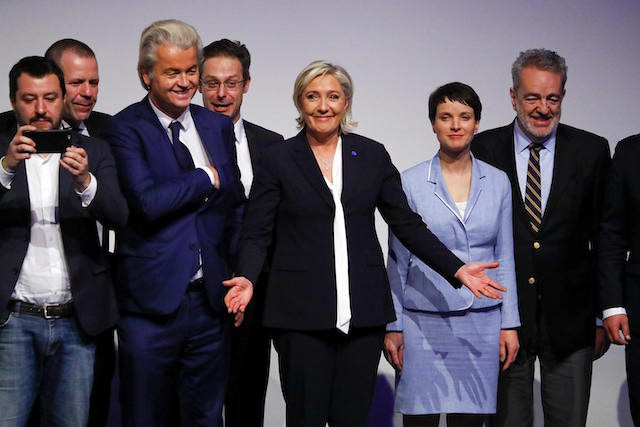Le Pen told several hundred supporters in the German city of Koblenz that Britons’ vote last year to leave the European Union would set in train a “domino effect”.
A day after U.S. President Donald Trump took office, Le Pen said his inauguration speech included “accents in common” with the message on reclaiming national sovereignty proclaimed by the far-right leaders meeting in Koblenz.
“2016 was the year the Anglo-Saxon world woke up. I am sure 2017 will be the year the people of continental Europe wake up,” she said to loud applause on Saturday.
Populist parties are on the rise across Europe. Unemployment and austerity, the arrival of record numbers of refugees and militant attacks in France, Belgium and Germany have left voters disillusioned with conventional parties.
Protestors gather during a demonstration near the building where European far-right leaders meet in Koblenz, Germany, 21 January 2017. The banner reads: “Nationalism has no future”. Photo: Reuters/Kai Pfaffenbach
Le Pen, head of the anti-European Union, anti-immigrant National Front (FN) and seen by pollsters as highly likely to make a two-person runoff vote for the French presidency in May, has marked out Europe as a major plank in her programme.
“The key factor that is going to set in course all the dominos of Europe is Brexit,” Le Pen said. “A sovereign people chose ... to decide its destiny itself.”
Of Trump, she added: “His position on Europe is clear: he does not support a system of oppression of peoples.”
In a joint interview with the Times of London and the German newspaper Bild published on Monday, Trump said the EU had become “a vehicle for Germany” and predicted that more EU member states would vote to leave the bloc, as Britain did last June.
Le Pen said if elected she would ask the EU to return sovereign powers to France and hold a referendum on the outcome of negotiations she expected to follow. If the EU rejected her demands, she said: “I will suggest to the French people: exit!”
“FREE FATHERLANDS”
The far-right leaders met under the slogan “Freedom for Europe” with the aim of strengthening ties between their parties, whose nationalist tendencies have hampered close collaboration in the past.
“Together with the parties represented here, we want a subsidiary Europe of free Fatherlands,” said Frauke Petry, leader of Germany’s anti-immigration Alternative for Germany (AfD).
Alternative for Germany (AfD) leader Frauke Petry (left) and France’s National Front leader Marine Le Pen (right) arrive for a European far-right leaders meeting on the European Union, in Koblenz, Germany, 21 January 2017. Photo: Reuters/Wolfgang Rattay
Several leading German media were barred from the Koblenz meeting, which was organised by the Europe of Nations and Freedom (ENF), the smallest group in the European Parliament.
Also at the meeting were Geert Wilders, leader of the Dutch far-right Freedom Party (PVV), who was last month convicted of discrimination against Moroccans, and Matteo Salvini of the Northern League, who wants to take Italy out of the euro.
In the Netherlands, Wilders is leading in all major polls before national parliamentary elections on March 15. Hailing Trump’s election, Wilders told the meeting: “Yesterday, a free America, today Koblenz, and tomorrow a new Europe.”
“The genie will not go back into the bottle,” he added.
Jean Asselborn, Luxembourg’s LSAP foreign minister, speaks to protestors outside the meeting of European far-right leaders in Koblenz, Germany, on 21 January 2017. Asselborn said: “We stand for an open, tolerant and social Europe of the 21st century. Not for a gray Europe of the 19th century,” according to a video clip posted on the Luxembourg foreign ministry’s Twitter feed.
Sigmar Gabriel, the leader of Germany’s Social Democrats, junior partner in Chancellor Angela Merkel’s ruling coalition, joined a protest outside the venue. Police said the demonstration was peaceful and about 5,000 people took part.
(Additional reporting by Hans-Edzard Busemann; Editing by Larry King)



